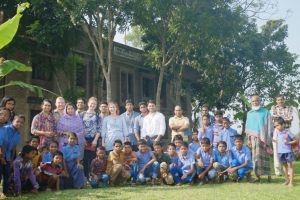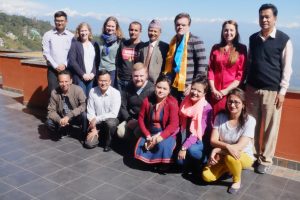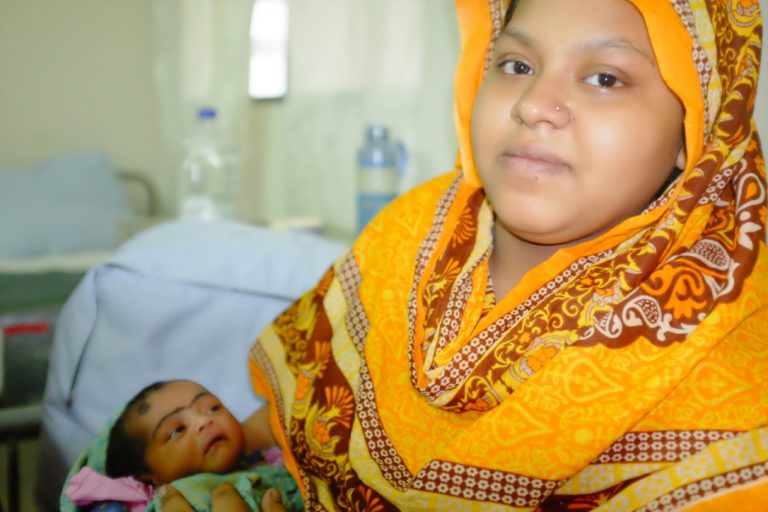Following the ENAP Research Design Workshop for Facility Based Metrics held in April 2016, ENAP metrics team and research partners have been working hard towards implementing the first step on the measurement improvement roadmap relating to facility-based testing of coverage indicators for selected interventions for Every Newborn Action Plan and Strategies Toward Ending Preventable Maternal Mortality (EPMM). Four members of the London School of Hygiene and Tropical Medicine (LSHTM) ENAP metrics technical team recently visited Bangladesh and Nepal for face to face meetings and visits to health facilities included in ENAP facility-based testing hosted by research partners International Centre for Diarrhoeal Disease Research, Bangladesh (ICDDR,B) and UNICEF Nepal respectively.
Study background
In September 2014, the five-year, multi-partner ENAP Measurement Improvement Roadmap was published presenting steps to meet the key ENAP milestones. This roadmap, developed through wide consultation, is coordinated via the ENAP metrics group* in combination with EPMM metrics work. Priority indicators between the two strategies have been identified and now there is an urgent need to test and improve programmatic data, especially for coverage of high-impact interventions.
The ENAP metrics facility-based study is specifically testing coverage indicators for the following five selected interventions: Uterotonics, Resuscitation, Kangaroo Mother Care (KMC), Possible Severe Bacterial Infection (PSBI) treatment and Antenatal Corticosteroids (ACS). Tanzania, Bangladesh and Nepal are the leading sites for this facility-based research led by country partners IFAKARA, International Centre for Diarrhoeal Disease Research, Bangladesh (ICDDR,B) and UNICEF Nepal respectively. More details of the study can be found in the recently published workshop report, Every Newborn Action Plan Metrics: Design Workshop for Facility-based Testing of Coverage Metrics.
Formative phase site visits
Following Institutional review board ethical approvals in country and at LSHTM, the initial formative phase of the research was launched. Key aspects of the formative phase involve health facility assessments, data flow analysis, qualitative piloting of the tools and observer training.
The main aim of the recent site visits was to carry out a formative phase visit to better understand the research facility sites’ capacity and service readiness to provide the five maternal and newborn health interventions, data flow management and specific issues regarding methodological study issues. Both countries also held stakeholder meetings to launch the study with key sector actors, including the Ministries, UNICEF, WHO, Saving newborn Lives and professional associations.
Two recent successful research site visits for Every newborn metrics technical team in Bangladesh and Nepal demonstrate continued progress towards the ambitious first step on ENAP measurement improvement roadmap.
1) Bangladesh site visit
International Centre for Diarrhoeal Disease Research, Bangladesh (ICDDR,B) impressively coordinated the log istics for the seven day site visit from the 28th October to 2nd November. All three facility research sites were visited including Maternal and Child Health Training Institute (MCHTI), the tertiary health facility in Dhaka; and Kushtia District Hospital and Daulatpur Sub-district Hospital, two facility sites located in Kushtia roughly an 8 hour drive from Dhaka. Details about the five interventions, register and recording procedures and the patient journey were highlighted during each visit. The Kushtia site visit had an ambitious and full itinerary which also included visits to two SNL Essential newborn care training and two community level Union clinics to better understand how interventions at community level in Kushtia, a key meeting with the Kushtia’s District Health Director General, and visits to icddr,b’s CRVS project which is using an innovative mobile app for birth and death notifications.
istics for the seven day site visit from the 28th October to 2nd November. All three facility research sites were visited including Maternal and Child Health Training Institute (MCHTI), the tertiary health facility in Dhaka; and Kushtia District Hospital and Daulatpur Sub-district Hospital, two facility sites located in Kushtia roughly an 8 hour drive from Dhaka. Details about the five interventions, register and recording procedures and the patient journey were highlighted during each visit. The Kushtia site visit had an ambitious and full itinerary which also included visits to two SNL Essential newborn care training and two community level Union clinics to better understand how interventions at community level in Kushtia, a key meeting with the Kushtia’s District Health Director General, and visits to icddr,b’s CRVS project which is using an innovative mobile app for birth and death notifications.
The ENAP metrics study was officially launched in Dhaka on the 1st November during a “ENAP Measurement Improvement Roadmap: Sensitization Workshop on Validation of Coverage Indicators for Facility-based Interventions” with over 40 newborn health sector stakeholders. The study was well-received and much interest was shown during the lively discussion following the presentations.
A huge thanks to the icddr,b team for hosting and for the lovely exposure to Kushtia’s Lalon legendary music, and to Jahiduj’s family for their memorable, delicious home cooked breakfast on our way back to Dhaka.
2) Nepal site visit
 UNICEF Nepal graciously hosted the ENAP LSHTM team from the 2nd to 5th November. The facility site, Paropakar Maternity and Women’s Hospital, was visited to observe key aspects regarding the implementation of the five interventions, the facility’s paper based to electronic record system and the patient journey. Key meetings were held with the implementing partner Lifeline Nepal (LLN) research team, UNICEF health staff, WHO staff, and Ministry representatives including the Director of Child Health Division, IMNCI Chief, and Planning Chief.
UNICEF Nepal graciously hosted the ENAP LSHTM team from the 2nd to 5th November. The facility site, Paropakar Maternity and Women’s Hospital, was visited to observe key aspects regarding the implementation of the five interventions, the facility’s paper based to electronic record system and the patient journey. Key meetings were held with the implementing partner Lifeline Nepal (LLN) research team, UNICEF health staff, WHO staff, and Ministry representatives including the Director of Child Health Division, IMNCI Chief, and Planning Chief.
The ENAP metrics study, timeline and health facility assessment were presented at the IMNCI technical working group meeting to over 30 stakeholders with great interest. Following this presentation, the research teams then went to Nagarkot for a productive 2-day workshop which was impressively led by UNICEF to discuss specific aspects of the research and data linking. Nepal’s national ENAP will be launched nationally a week after World Prematurity Day on the 24th of November.
A huge thanks to UNICEF Nepal and Lifeline Nepal for hosting, for the delicious momos and lovely view Himalayan view from Nagarkot.
Next steps
We look forward to ongoing collaborative formative phase work with the strong and impressive research teams in Bangladesh and Nepal following our site visits.
The next site visit will take place at the end of the month in Tanzania with our research partner IFAKARA in partnership with MUHAS. Following this visit, Tanzania will host the three country “ENAP Design Workshop for the Harmonisation of Data Collection Procedures for Facility-based Testing Observational Study” from the 5th to the 8th of December at White Sands, Dar es Salam, Tanzania.
After the collaborative technical December workshop, training and the piloting of the tools will commence with data collection timetabled for March. The final protocol and related tools will be shared on Healthy Newborn Network in the coming months.
Special thanks to Children’s Investment Fund Foundation (CIFF) for funding facility-based testing in Bangladesh and Tanzania and to UNICEF Nepal for supporting the work in Nepal.
More information
Every Newborn Action Plan Metrics: Design Workshop for Facility-based Testing of Coverage Metrics
WHO technical consultation on newborn health indicators: every newborn action plan metrics
Count every newborn; a measurement improvement roadmap for coverage data
* The ENAP Metrics working group is co-chaired by the World Health Organization (WHO) and London School of Hygiene & Tropical Medicine (LSHTM), and has a mandate to work with multiple partners to ensure the milestones in the Action Plan related to metrics are delivered on in time, and tools and learning are widely shared and available in open access for use in countries.
